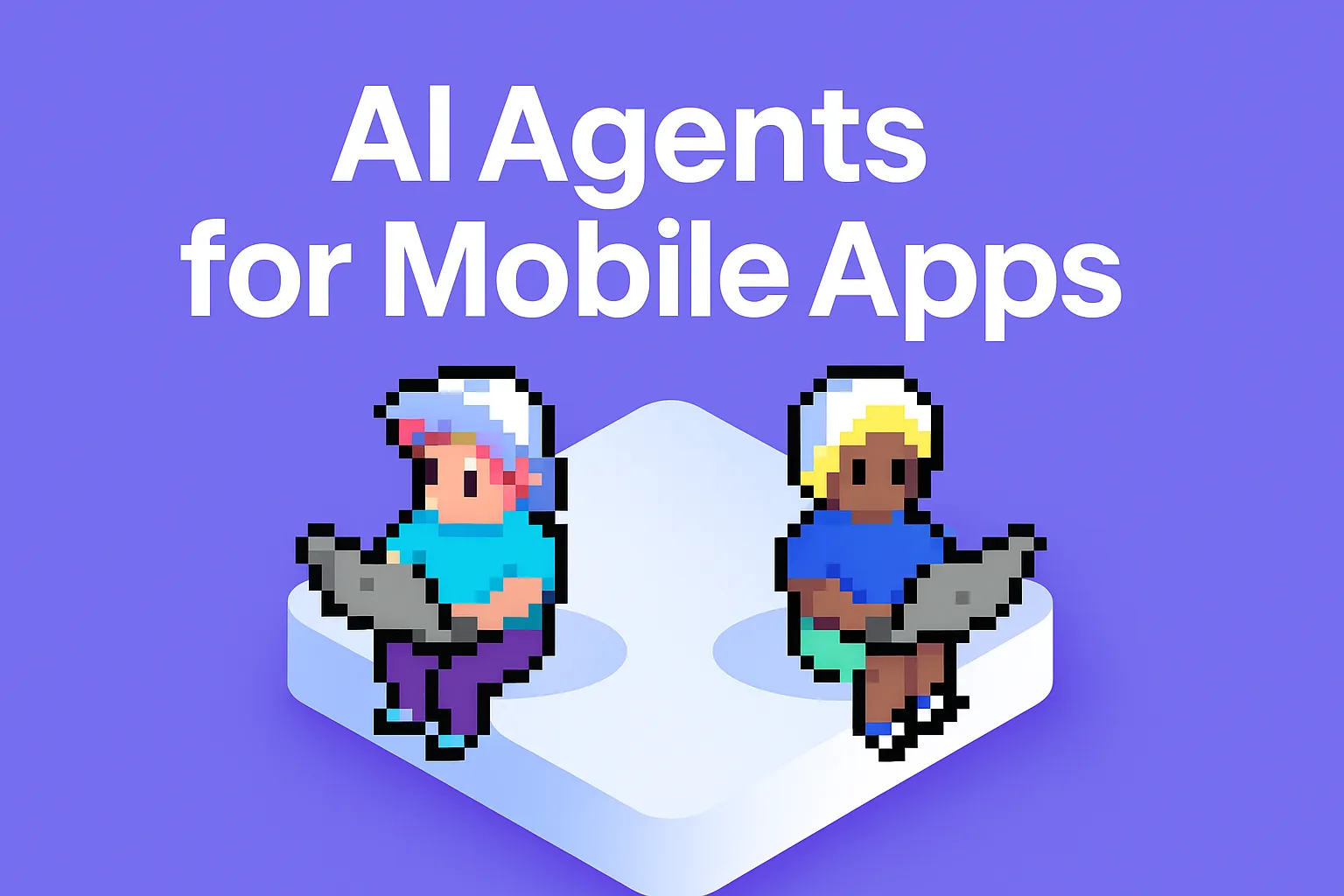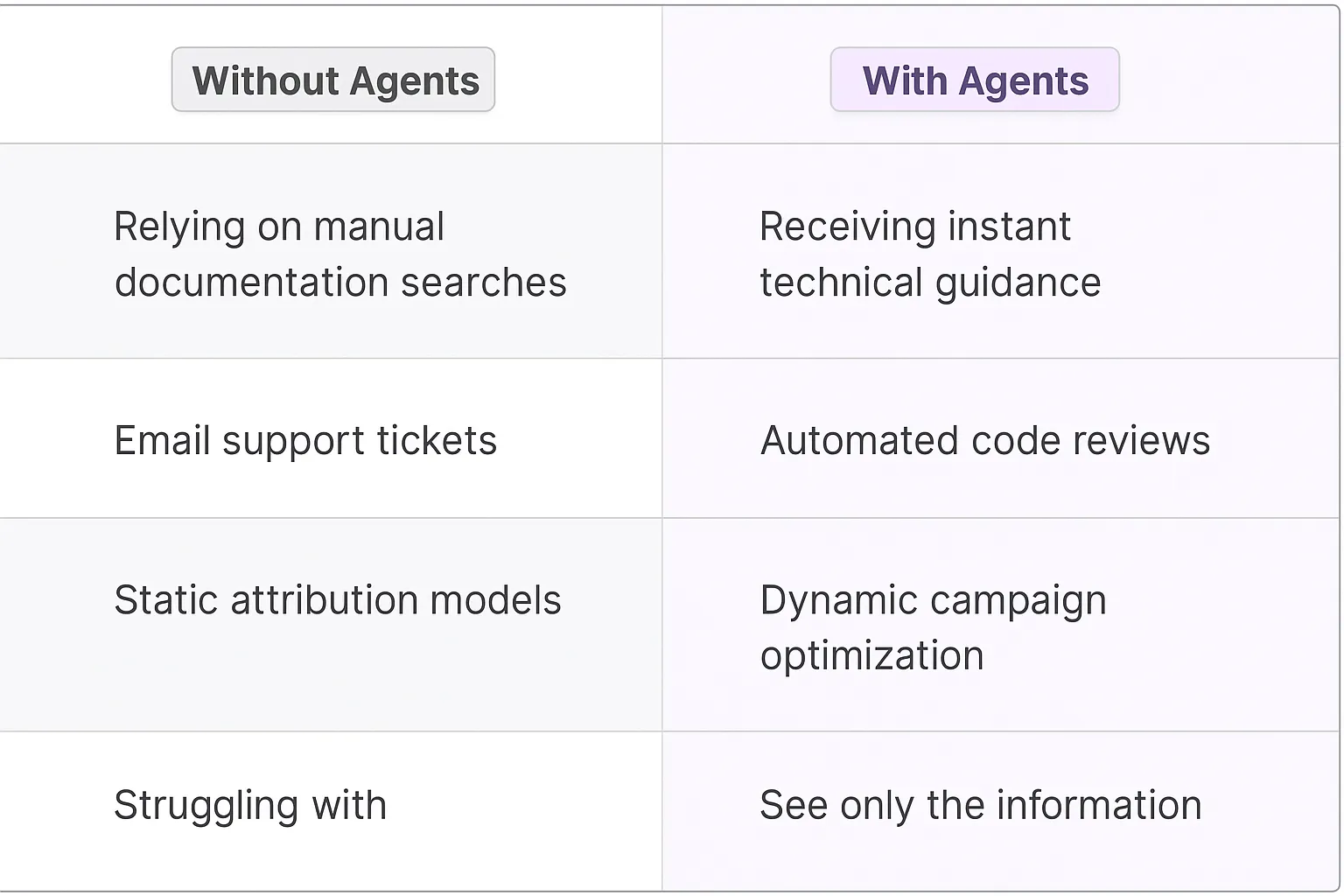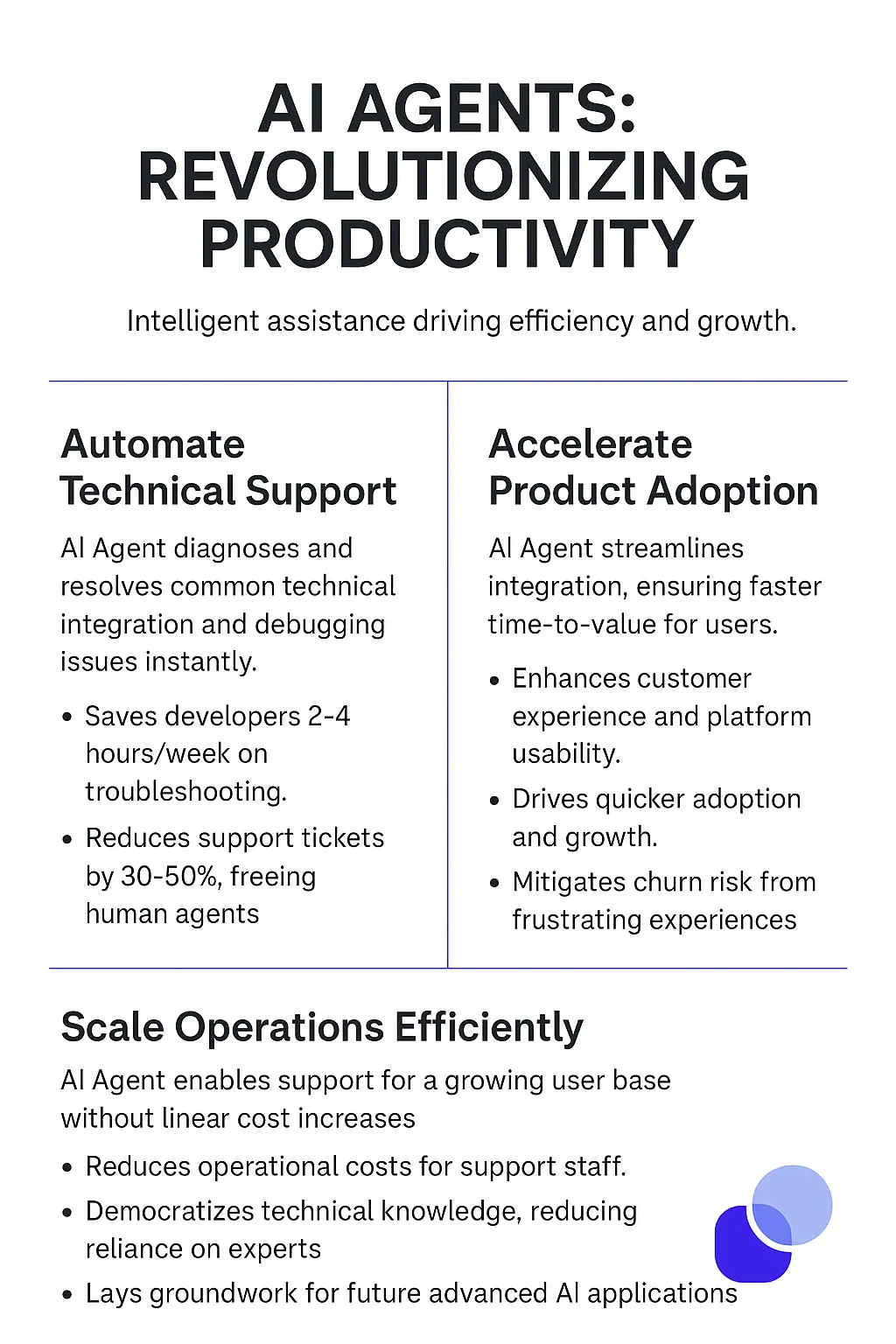Branch
Branch's Mobile Measurement and Deep Linking Platform
What is Branch?
Branch is a mobile measurement and deep linking platform that powers seamless mobile experiences and measurement for over 100,000 apps. The platform helps companies grow their mobile business with solutions for user acquisition, engagement, and measurement. Branch's technology solves complex mobile challenges around attribution, deep linking, and app discovery.
Key Features of Branch
- Deep linking infrastructure that routes users to optimal app experiences
- Cross-platform attribution for accurate campaign measurement
- Fraud prevention systems to ensure data quality
- Analytics dashboards for granular performance insights
- API integrations with major advertising platforms
- AI-powered optimization tools for mobile growth

Benefits of AI Agents for Branch
What would have been used before AI Agents?
Before AI agents entered the scene, Branch users relied on traditional support documentation, email tickets, and manual troubleshooting processes. Teams spent countless hours digging through documentation, waiting for support responses, and dealing with repetitive technical issues. Development teams faced context-switching costs as they jumped between coding and resolving basic integration questions.
What are the benefits of AI Agents?
Branch's AI agents fundamentally transform how mobile developers and marketers interact with the platform. These digital teammates operate at the intersection of deep technical knowledge and rapid problem-solving, creating multiplicative effects across teams.
The most striking benefit is the elimination of documentation hunting. The AI agents parse Branch's extensive technical documentation in milliseconds, delivering precise answers about implementation details, SDK integration, and attribution mechanics. This represents a massive efficiency unlock - developers maintain their flow state instead of context-switching to search docs.
For mobile growth teams, the agents provide real-time guidance on attribution modeling, conversion tracking, and campaign optimization. They can explain complex concepts like probabilistic matching and deterministic fingerprinting in clear, actionable terms. This democratizes deep technical knowledge that was previously siloed in senior engineers' heads.
The agents also excel at debugging common integration issues by analyzing error logs and suggesting specific fixes. This pattern-matching capability, built on thousands of previous support cases, dramatically reduces time-to-resolution for technical problems.
Perhaps most importantly, the AI agents learn and improve through each interaction. They build an ever-expanding knowledge base of edge cases, workarounds, and best practices - creating a flywheel effect where the system gets more valuable as usage increases.
This represents a step-function improvement in how teams leverage Branch's capabilities. The agents serve as always-on technical experts, reducing friction in the development process and enabling teams to ship mobile features faster.

Potential Use Cases of Branch AI Agents
Branch AI agents transform how engineering and product teams handle code reviews, documentation, and deployment processes. These digital teammates integrate directly into existing development workflows, providing specialized support for technical tasks that typically consume valuable engineering hours.
Code Review & Analysis
- Automated code quality assessment with detailed explanations of potential improvements
- Security vulnerability scanning with specific remediation suggestions
- Performance optimization recommendations based on established patterns
- Documentation gaps identification and automated documentation generation
Development Workflow Enhancement
- Git branch management and merge conflict resolution
- Pull request summaries with impact analysis
- Technical debt identification and prioritization
- Code refactoring suggestions with implementation examples
Knowledge Management
- Codebase documentation maintenance and updates
- API documentation generation and validation
- Architecture decision records (ADR) creation and management
- Onboarding guide generation for new team members
Testing & Quality Assurance
- Test case generation based on code changes
- Coverage analysis and testing gap identification
- Integration test scenario recommendations
- Bug reproduction steps documentation
Impact on Development Teams
Engineering teams implementing Branch AI agents typically see a 30-40% reduction in time spent on routine code reviews and documentation tasks. This shift allows developers to focus on complex problem-solving and feature development while maintaining high code quality standards.
The real power lies in the compound effect - as these digital teammates learn from each interaction, they become increasingly valuable partners in the development process, understanding team-specific patterns and preferences while maintaining consistent code quality standards across projects.
Integration Benefits
Branch AI agents work alongside existing development tools, creating a seamless workflow that doesn't disrupt established processes. They enhance rather than replace human decision-making, providing data-driven insights that improve the quality of technical decisions while reducing the cognitive load on development teams.
The network effect becomes apparent as more teams adopt these digital teammates - shared knowledge and best practices propagate naturally through the organization, creating a more cohesive and efficient development environment.

Industry Use Cases
Branch AI agents are transforming how teams collaborate and execute across multiple sectors. The real power lies in their ability to handle complex, multi-step processes while maintaining context and delivering consistent results. Drawing from my experience working with hundreds of startups and enterprise teams, I've observed several compelling applications that demonstrate clear ROI and meaningful impact.
What makes Branch AI agents particularly effective is their ability to operate within existing workflows while adding layers of intelligence and automation that actually matter to end users. Unlike traditional automation tools that often create more friction than they solve, these digital teammates integrate naturally into daily operations, learning and adapting to team-specific needs.
The following industry examples showcase how Branch AI agents tackle real business challenges - from reducing manual data entry in financial services to enabling faster product development in software companies. Each case demonstrates measurable improvements in team productivity and output quality.
Gaming Industry: Leveling Up Player Acquisition with Branch AI
Mobile gaming studios face intense competition for player attention and retention. The core challenge isn't just acquiring users - it's finding the right users who will become long-term, high-value players. Branch AI agents transform this dynamic by bringing intelligence to every touchpoint in the player journey.
A Branch AI agent can analyze vast datasets of player behavior patterns, from initial app store discovery through the critical first 7 days of gameplay. This deep behavioral analysis enables gaming companies to identify the characteristics and actions that signal a potential whale (high-value player) versus someone likely to churn.
The agent continuously monitors key metrics like tutorial completion rates, session frequency, and in-app purchase patterns. When it detects opportunities, it automatically adjusts UA campaigns and personalizes the player experience. For example, if a cohort of players consistently drops off at level 3, the agent can modify difficulty curves or trigger targeted support resources.
Beyond reactive optimization, Branch AI agents excel at predictive modeling for user acquisition. By processing historical player data, they can forecast lifetime value potential before spending precious marketing dollars. This leads to dramatically more efficient UA spend - early data shows gaming companies using Branch AI agents see up to 40% lower cost per acquired player while maintaining quality.
The most sophisticated gaming studios are using Branch AI agents to create closed-loop systems where acquisition, retention and monetization strategies evolve together. When the agent identifies a highly engaged player segment, it automatically scales up similar player acquisition while tailoring the in-game experience to maximize long-term retention.
This represents a step-change in how gaming companies approach growth - moving from static campaigns to dynamic, AI-powered player acquisition that gets smarter over time. For mobile gaming studios competing in a crowded market, Branch AI agents provide the intelligence layer needed to find and retain their most valuable players.
Travel Industry: How Branch AI Transforms Customer Acquisition
Travel companies operate in a complex ecosystem where customer acquisition costs keep climbing while conversion windows remain frustratingly short. The traditional spray-and-pray approach to marketing simply doesn't cut it anymore. Branch AI agents are rewriting the rules by bringing precision targeting and behavioral intelligence to travel marketing.
The most sophisticated travel brands are deploying Branch AI agents to decode the intricate patterns in customer booking behavior. These agents analyze thousands of data points - from initial flight searches to final booking decisions - identifying the micro-moments that determine whether someone books or bounces.
A standout capability is the agent's ability to detect high-intent travelers before they even start comparing prices. By processing signals like search patterns, browsing duration, and interaction depth, the AI can spot users who are 3x more likely to book within the next 72 hours. This intelligence allows travel companies to adjust their bidding strategies in real-time, focusing resources on the most promising prospects.
The results speak volumes - travel brands using Branch AI agents report 35% lower customer acquisition costs while maintaining or increasing booking values. The key is the agent's ability to build rich behavioral profiles that go far beyond basic demographics. It understands that a business traveler searching for Tuesday morning flights has different needs and price sensitivity than a family planning their summer vacation.
Branch AI agents excel at identifying and capitalizing on seasonal patterns and demand shifts. When the agent detects an uptick in searches for specific destinations, it automatically adjusts targeting parameters and messaging across channels. This dynamic optimization ensures marketing spend flows to the highest-potential opportunities.
For travel companies drowning in data but starving for insights, Branch AI agents provide the missing link between customer understanding and marketing execution. They're not just optimizing campaigns - they're fundamentally changing how travel brands connect with and convert their most valuable customers.
Considerations and Challenges
Implementing Branch AI agents requires careful planning and strategic thinking around several key areas. The complexity increases as these digital teammates become more integrated into core business processes.
Technical Integration Challenges
Branch AI agents need robust API connections and data access permissions across multiple systems. This creates potential security vulnerabilities that must be carefully managed. The agents require significant computing resources to handle natural language processing and machine learning tasks effectively.
Data quality becomes critical - Branch agents learn from historical interactions and need clean, well-structured data to make accurate decisions. Organizations often underestimate the engineering work needed to prepare and maintain high-quality training datasets.
Operational Considerations
Teams need clear protocols for when Branch agents should escalate issues to human teammates. Without proper boundaries, agents may attempt to handle situations beyond their capabilities. This requires ongoing monitoring and refinement of decision-making parameters.
Employee training and change management prove essential. Teams must understand how to effectively collaborate with Branch agents, including their capabilities and limitations. This often requires shifts in existing workflows and processes.
Scaling and Maintenance
As usage grows, Branch agents need infrastructure that can scale dynamically. Performance monitoring becomes more complex with increased interaction volume. Teams must implement robust testing processes to catch potential issues before they impact users.
Regular model updates and retraining are necessary to maintain accuracy and relevance. This creates additional operational overhead that organizations need to factor into their resource planning.
Compliance and Governance
Branch agents must operate within regulatory frameworks, especially when handling sensitive data. Organizations need mechanisms to audit agent decisions and maintain accountability. Clear documentation of agent capabilities and limitations helps manage risk and ensure appropriate use.
AI Agents: Transforming Mobile Development Through Network Effects
Branch AI agents mark a fundamental shift in how mobile teams operate. The technology demonstrates clear network effects - each interaction makes the system more valuable for all users. For mobile-first companies, these digital teammates reduce friction in development workflows while democratizing technical knowledge. The data shows significant efficiency gains: faster issue resolution, improved code quality, and accelerated feature deployment. As AI capabilities continue advancing, Branch's approach sets a new standard for technical platforms.













